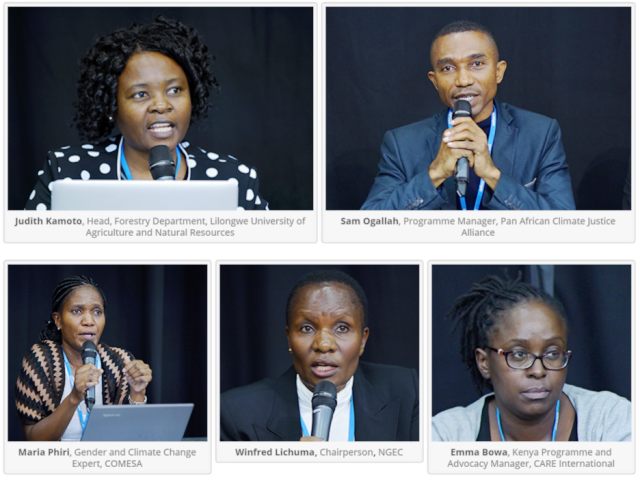PACJA Side Event Report -Gender and CC-The African perspectives
The event on Gender, Climate Change and Sustainable Development in Africa was moderated by Sam Ogallah, Programme Manager, Pan African Climate Justice Alliance. He opened the event saying that the effort is to strengthen the African Group's position on the issue of gender and climate change. He said the issue of gender includes men, people with disabilities, and others. He noted that gender has been dealt with on an ad hoc basis and that it needs to be operationalized into a set of policies.
Winfred Lichuma, Chairperson, National Gender and Equality Commission, Kenya, said that gender desegregation is a missing link in the UNFCCC process and there is a need to integrate gender into the negotiations. She said that climate change must be understood through the gender lens.
Judith Kamoto, Head, Forestry Department, Lilongwe University of Agriculture and Natural Resources (LUANAR), presented on mainstreaming gender in climate actions, describing Malawi’s experience in the forest sector. She noted that gender disparities are entrenched in the culture, decisions over land are usually made by men, and that women have time constraints that impede them from participating in community governance on forests. Regarding community based forest management under REDD+, she recommended having full time gender specialist staff, raising awareness about gender implications and benefit sharing, ensuring equal access to forest resources, empowering women in participation and overcoming institutional and socio-cultural barriers.
Maria Phiri, Gender and Climate Change Expert, Common Market for Eastern and Southern Africa (COMESA), said that climate change is about human development, and that it cannot be discussed in relation to future development pathways without addressing gender. She underscored the need for inclusivity and empowerment of women, and said that the Paris agreement must be a “gender responsive platform.” She emphasized the need to bring diverse stakeholders on board and said that the issue of gender is the issue of participation of all people. She underscored that sustainable economic growth requires all stakeholders to participate in terms of input in order to benefit from the output.
Emma Bowa, Kenya Programme and Advocacy Manager, CARE International, said that when discussing gender issues in relation to climate change, it is important to talk not only about exposure, sensitivity and capacity, but also about roles and responsibilities. Regarding the Paris agreement, she said that it is important to recognize that women are not just a homogenous block and that more important than just counting the number of women who are represented, it is essential to build agency and improve relations between men and women.
During discussions, panelists noted that, inter alia, gender should be considered in the entire text of the Paris outcome, negotiators should insist on rights-based language since human rights includes gender and that gender not be sidelined to a “women’s issue.


Comments